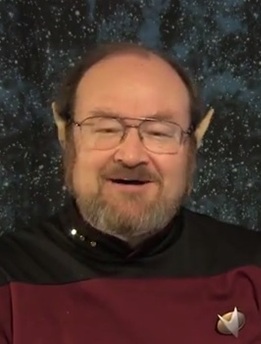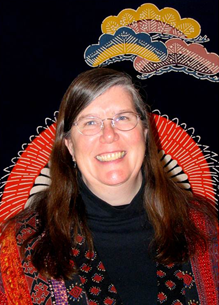“Guest lectures” by Mister Spock, King Arthur, and Aristotle were part of Professor Star Muir’s strategic course design to help digital age students focus their attention in COMM 300 Foundations of Public Communication online. Professor Muir’s academic research focus is Digital Natives and the impact of continual partial attention to different media streams on the mind, mental processing, and mental habits. Since he is keenly aware that many students today have difficulty focusing, Professor Muir developed course videos, activities, and writing assignments that could effectively engage them.
Professor Muir impersonates King Arthur in order to engage students in a discussion
about mythic criticism. Video courtesy of Professor Muir.
Professor Muir used unique themes, humor, and ethos in course videos to captivate the attention of Digital Natives. Accordingly, he impersonated Mister Spock in the COMM 300 Welcome Video, pretended to be Aristotle while giving an overview of the history of rhetoric, and feigned he was King Arthur while teaching about mythic criticism.

Mister Spock “guest lectures” in Prof. Star Muir’s COMM 300 online course.
In reference to the course videos, one student in an end-of-semester review stated: “I felt they were informative and kept me interested since [he] had a unique theme for each one.” Another student noted that the videos were so engaging that her son would watch them with her when she studied at home.
Students also identified the course “playsheets” to be an outstanding course component in their reviews. Playsheets were designed based on Guided Discovery theory and composed of a sequence of critical tasks. The first task encouraged students to simply recall information. Subsequent questions required students to perform deeper cognitive tasks such as evaluating and creating knowledge.
Professor Muir explained that playsheets “were designed to engage students and develop their capacity to make arguments about rhetoric.” He expounded, saying that they “empower students to use their technologies for their own learning, engage them about the quality and reliability of their information, and make excellent study resources.”
A third highly empowering and engaging aspect of the course was faculty feedback. “I thought the best part about the course was the feedback given for the different writing assignments,” one student shared. “It was very thorough and helpful for future assignments,” he continued.
Over the years, Professor Muir has identified the most common problems in COMM 300 students’ writing and composed comments to help correct each problem. These comments include a description of the issue, URLs for helpful resources, references to page numbers from the readings, and correct examples. He uses a macros system that allows him to insert relevant comments with a single keystroke every time he identifies an issue in a paper. The macros system also freed up Professor Muir’s time so he could examine the papers’ content, structure, arguments, and use of vocabulary more meticulously.
This course video introduces students to theories of Sophists, Plato, and Aristotle as well as
the definition of rhetoric, artistic proofs, types of discourse, and the five canons.
If you have ever played on your phone during an entire lecture or been victim to “death by PowerPoint”, Professor Muir’s online section of COMM 300 is the course for you. As a COMM 300 online student, you will find yourself looking forward to each lecture and anxious to see who the weekly “guest speaker” will be. You will be invigorated by the guided deep thinking with the playsheets and see your growth as a writer. Register early to ensure your spot!
COMM 300 fulfills the writing intensive requirement of the BA in Communications.


